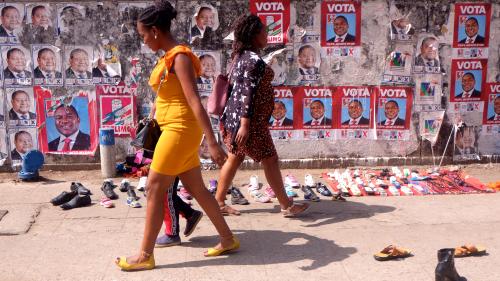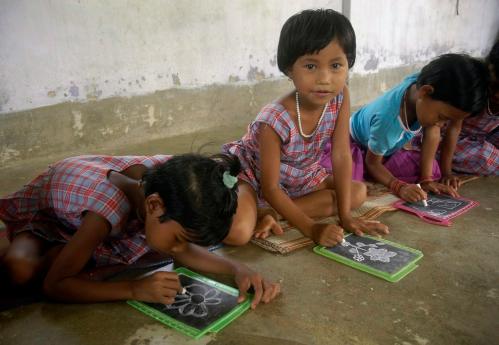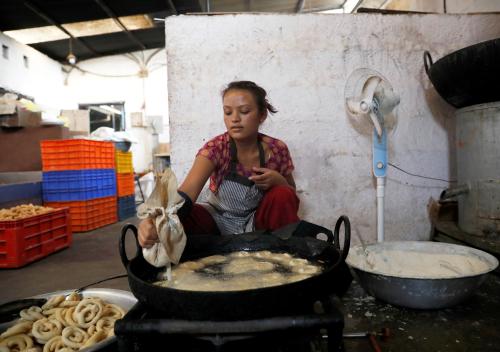Every year billions of dollars are poured into development projects and programs to promote gender equality in economic opportunity. Some argue that these investments do not have any long-term effects on women’s employment and entrepreneurship patterns because human behaviors are very difficult to change. Behaviors are determined by strong social norms and personal beliefs about the roles that men and women should play in society.
There is some truth to this argument. The World Development Report 2015 “Mind, Society, and Behavior” stresses the influence of psychological and social factors on behavior and decisionmaking. Indeed, a wealth of research finds that restrictive and persistent gender norms are a significant obstacle to women’s economic empowerment. For example, in Jordan only 14 percent of women participate in the labor force, with the main reason being that work outside the home interferes with societal expectations of women as the main caregivers and caretakers of households. Another study covering Egypt, Lebanon, Morocco, and Palestine finds that these norms are upheld even in the face of severe economic challenges and the enormous pressure that men feel to financially provide for their families. Seemingly, culture and beliefs continue to influence women’s economic choices even after migrating to other countries, as observed in a study on second-generation American women.
An important question emerges: How rigid are these gender norms and can behavior change interventions transform them in a significant and sustainable way? There are no simple answers. However, recent research on migrant communities in Sweden can shed some light. This study uses World Values Survey questions to analyze the beliefs of migrant communities such as Iranians, Iraqis, and Turks on a host of topics such as gender equality, homosexuality, abortion, and divorce. The migrants’ beliefs are compared to the dominant beliefs in their countries of origin as well as to the beliefs of the majority population in Sweden.
Fascinating findings emerge. For example, 69 percent of Iranians living in Iran agree with the statement “When jobs are scarce, men should have more right to a job than women” (see Figure 1). Among Iranian-Swedes, the percentage is only 17 percent. Similarly, 78 percent of Iraqis living in Iraq agree with the statement compared to only 24 percent of their compatriots in Sweden. Interestingly, only 2 percent of the majority population in Sweden agrees with the statement.

Similar results are found when asked whether men make better business executives than women. Sixty-six percent of Turks in Turkey versus only 20 percent of Turks in Sweden agree or strongly agree with this statement (see Figure 2). These large “belief gaps” are also observed between Iraqis and Iranians in Sweden and the populations in their countries of origin.

While this study does not provide all the answers, it does suggest that norms may not be as rigid as assumed. Other research supports this idea. For example, a study of rural-urban migrants in Cambodia finds that attitudes on women’s work change with raised opportunity costs of women staying at home, greater exposure to women working in masculine domains, and more avenues that challenge established and homogenous gender roles. Similarly, an experiment in Saudi Arabia finds that men underestimate other men’s support for women’s work. Interestingly, when these men learn about other men’s views, they become more progressive in their own views and behaviors.
What does all of this mean for development policies and programming? There are two main approaches to addressing social norms while promoting women’s economic empowerment in programs and projects. The first is to work within the existing social norms. Many development projects are modified with a gender lens to accommodate women’s efforts to balance their productive and reproductive roles. This includes supporting flexible work arrangements (for example, part-time and home-based work), increasing access to quality and affordable childcare, promoting safe work environments free of sexual harassment, improving the efficiency and safety of public transportation, and so on.
The second approach is to design programs and project interventions that directly target the underlying social norms and beliefs. For example, behavior change research and interventions in, among others, India, Ethiopia, Georgia, Zambia, Mexico, Nigeria, Rwanda, and Brazil, target social norms to reduce child marriage, address sex-preference of children at birth, reduce gender-based violence, promote women’s economic activity, expand women’s access to digital financial services, and engage men in supporting women’s economic empowerment.
Both of these approaches to addressing social norms are important as development practitioners aim to advance women’s economic empowerment. Interventions that work within existing norms and accommodate women’s multiple roles are not futile. With more women in the workforce, gender norms will gradually and inevitably change. At the same time, it would be a great loss to not directly target undesirable norms that restrict the roles of both women and men. There are many strategies and examples across the world of how social norms can be influenced. What’s important in all of this is to involve men in the conversation. It will be difficult, if not impossible, to close gender gaps if men are not part of the solution.









Commentary
Promoting women’s economic empowerment: Mission impossible?
October 28, 2019